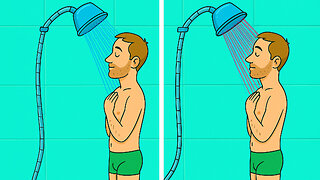Premium Only Content

Vitamin B1: Synthetic vs. Natural – Dr. Berg
Are you taking synthetic vitamins every day? Find out why this may not be the best choice for your health.
Nutritional Yeast: https://shop.drberg.com/nutritional-yeast-regular
0:00 Introduction: Synthetic vs. natural vitamin B1
0:10 Function of vitamin B1
0:26 Symptoms of a vitamin B1 deficiency
0:54 Synthetic B1 vitamins
2:11 Comparing natural vs. synthetic vitamins
2:45 Thanks for watching!
In this video, we’re going to talk about synthetic vitamins, specifically vitamin B1. Vitamin B1 is incredibly important, especially when you’re doing keto and intermittent fasting.
Vitamin B1 protects the arteries from damage caused by high sugar and high insulin. It protects the myelin sheath in the nervous system, and can also help relieve the body of stress.
Peripheral neuropathy and other issues with the nervous system are common symptoms of a vitamin B1 deficiency. You can also develop problems in your arteries that can build up to a blood clot. Consuming sugar and refined grains can deplete vitamin B1.
Synthetic B1 is made from coal tar, ammonia, acetone, hydrochloric acid, and other synthetic chemicals. Synthetic B1 typically comes in the form of thiamine mononitrate or thiamine hydrochloride. 85% of the world’s B1 comes from China where it's very cheaply made. You can find this cheap, synthetic vitamin B1 in prenatal vitamins, children’s vitamins, infant formulas, and other standard multivitamins.
Generally speaking, synthetic vitamin B1 is only useful if you’re doing a detoxification or if you’re trying to improve symptoms of peripheral neuropathy. Other than that, there is really no need for a “maintenance dose” of vitamin B1.
Nutritional yeast is one of the best natural sources of B vitamins, especially vitamin B1.
If you’re not sure if a vitamin is natural or synthetic, check the ingredients! Chemical names that don’t come from food are a tell-tale sign of synthetic vitamins.
Dr. Eric Berg DC Bio:
Dr. Berg, age 57, is a chiropractor who specializes in Healthy Ketosis & Intermittent Fasting. He is the author of the best-selling book The Healthy Keto Plan, and is the Director of Dr. Berg Nutritionals. He no longer practices, but focuses on health education through social media.
Follow Me On Social Media:
Facebook: https://bit.ly/FB-DrBerg
Instagram: https://bit.ly/IG-DrBerg
Anchor: https://bit.ly/Anchor-DrBerg
TikTok: https://bit.ly/TikTok-DrBerg
Send a Message to his team: https://m.me/DrEricBerg
Disclaimer:
Dr. Eric Berg received his Doctor of Chiropractic degree from Palmer College of Chiropractic in 1988. His use of “doctor” or “Dr.” in relation to himself solely refers to that degree. Dr. Berg is a licensed chiropractor in Virginia, California, and Louisiana, but he no longer practices chiropractic in any state and does not see patients so he can focus on educating people as a full-time activity, yet he maintains an active license. This video is for general informational purposes only. It should not be used to self-diagnose and it is not a substitute for a medical exam, cure, treatment, diagnosis, prescription, or recommendation. It does not create a doctor-patient relationship between Dr. Berg and you. You should not make any change in your health regimen or diet before first consulting a physician and obtaining a medical exam, diagnosis, and recommendation. Always seek the advice of a physician or other qualified health provider with any questions you may have regarding a medical condition.
#keto #ketodiet #weightloss #ketolifestyle
Thanks for watching! I hope this helps you understand the difference between natural and synthetic B1. I’ll see you in the next video.
-
 6:23
6:23
Dr. Eric Berg
8 days agoHow To Lose Weight WITHOUT Dieting
4.74K6 -
 22:39
22:39
The Mel K Show
8 hours agoMel K & Representative Brandon Gill | Our Constitutional Republic is Being Restored | 4-26-25
52.2K43 -
 4:17:17
4:17:17
VapinGamers
8 hours ago $4.22 earned📣 Fortnite Family Night! - Games and Dubs with BrianZGame - !rumbot
39.5K3 -
 4:27:48
4:27:48
ThePope_Live
6 hours agoLIVE - First time playing The Finals in over a YEAR! Still good? with @Arrowthorn
30.7K1 -
 3:06:26
3:06:26
TruthStream with Joe and Scott
12 hours agoRoundtable with Patriot Underground and News Treason Live 4/26 5pm pacific 8pm Eastern
50.9K34 -
 8:52
8:52
Tundra Tactical
10 hours ago $9.72 earnedSCOTUS Denies Appeal, Minnesota Courts Deal 2a Win!
51.7K11 -
 10:36:01
10:36:01
a12cat34dog
12 hours agoONE WITH THE DARK & SHADOWS :: The Elder Scrolls IV: Oblivion Remastered :: FIRST-TIME PLAYING {18+}
71.3K5 -
 22:27
22:27
Exploring With Nug
18 hours ago $12.83 earnedSwamp Yields a Chilling Discovery in 40-Year Search for Missing Man!
64.5K17 -
 1:23:26
1:23:26
RiftTV/Slightly Offensive
13 hours ago $12.20 earnedThe LUCRATIVE Side of Programming and the SECRETS of the "Tech Right" | Guest: Hunter Isaacson
70.7K36 -
 27:57
27:57
MYLUNCHBREAK CHANNEL PAGE
1 day agoDams Destroyed India
75.2K24